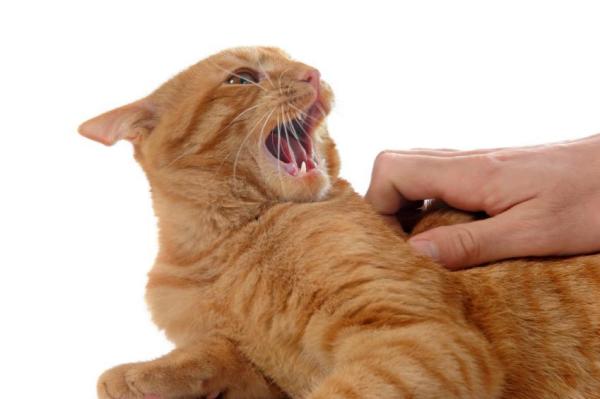
When your cat bites and scratches you, do you take it personally? Since our forms of communication with our cats are limited by our difference in species, it can be difficult to know what this behavior means. For many of us, the first thing we think might be they are angry or have a problem with us. At AnimalWised, we show you that there is no need to panic. While this behavior may be a sign of aggression, there are reasons behind it. By understanding why your cat bites and scratches you, you can know how to stop it. Often this involves redirecting the cat's behavior, but on many occasions, it is our behavior towards our cat which needs to be challenged.
Why my cat bites and scratches me
To understand any cat behavior, we need to look at the context of their actions. When a cat bites or scratches us is no exception. This means analyzing their environment, looking at related behaviors and observing for any symptoms of a problem. One of the key differentiations is whether the cat has always bit and scratched us, or if this is a new behavior which happens all of a sudden.
Here we look at some of the most common reasons a cat bites and scratches you:
The cat is playing
Play behavior is essential to a cat's well-being, especially when they are a kitten. By play fighting with their siblings and mother, they learn boundaries, the limits of their strength and other important lessons. Due to domestication, it is also something most cats will continue into their adult lives, even if not as regularly.
When a cat is taken from their mother and siblings too early, they will not learn these lessons. They will likely have poor boundaries, thinking it is fine to bite and scratch you when playing. They will not know bite inhibition and may even cause wounds due to their aggression.
Poor socialization when a cat bites and scratches us when playing doesn't necessarily mean they didn't learn lessons. It could mean they have assimilated the wrong lesson from us. Although kittens biting and scratching us can be very cute, if we tolerate this behavior when they are young, it makes perfect sense they will continue to do it when they are old.
As we stated above, context is everything. For example, there is often a difference between a cat biting you when you are playing and a cat biting you when you are asleep.
The cat is stressed
A stressed or anxious cat is an animal prone to attack. In these cases it is important that you identify the cause of their stress. It may be that the animal feels cornered or insecure due to a change of environment. Cats are delicate, methodical animals, they like routine, so any alteration of their territory can generate a stressful situation that can trigger aggressive behavior.
Anxiety in cats can come from many places. When they bite or scratch us, it is a symptom directed towards us. We need to assess their basic care and ensure we are not the contributing factor. For example, some guardians think their cats enough rough play, but actually, it is causing them stress and leading to behavioral problems.
The cat has a traumatic past
Being removed too early from their mother and siblings is a trauma in itself for cats. However, too many cats in this world are abused, neglected or abandoned by humans. When a cat experiences trauma at the hands of people, it is understandable they might associate us with such trauma. Biting and scratching might occur because they feel threatened.
While this happens mostly with trauma from their youth, your cat can still experience trauma later in life. If they have been in an accident, had a close call with another cat or experienced any kind of trauma, it can result in behavioral problems.
The cat is physically sick
Illness or bodily discomfort is also a typical cause for felines to bite or scratch. When a cat is not well or suffers some pain, it is more prone to aggressiveness. Cats hide their pain well, so it is vital we regularly observe for signs of pain in cats. Biting and scratching us is a defensive if we touch them somewhere painful, but it may also be due to the emotional stress their disease puts on them.
If you perceive that your cat's aggressive behavior is related to visible symptoms of a disease, such as loss of weight or appetite, there may be a serious underlying health problem. This is a reason why it is important to know if they do it all of a sudden. If a cat suddenly starts attacking you, it means something about them has changed.

What to do when a cat bites and scratches us
When your cat won't stop biting and scratching you, we need to evaluate the reasons. As stated above, if the cat has always enacted this behavior, it implies there is a problem arising from their youth. This is especially the case if you have adopted an older cat and don't know their history. Many cats from the shelter system have not been given the opportunity to learn proper interaction or may be traumatized by their experiences.
Bearing these factors in mind, we need to know what we can do to stop a cat biting and scratching:
- Set boundaries: teach your cat that you are not their prey. Have fun and play with them, but stop when they start to bite or scratch. By doing so, the cat should learn they will be unable to play with you if they keep being aggressive.
- Redirect behavior: a more active approach is to redirect aggressive biting and scratching behavior. Provide the animal with a scratching posts, toys and other accessories which keep them stimulated. When the cat starts to become aggressive, step away and give them the appropriate distraction. Over time, they should learn what is appropriate and what is not.
- Correct when necessary: if your cat bites or scratches you, react calmly. Remember that if you chase or yell at them, you will only scare and confuse them. You need to stop the situation, not to give him any treats or food after they bite you and remove affection until their behavior become appropriate. Positively reinforce good behavior, but don't negatively reinforce bad behavior.
- Visit the vet: as we have already explained, aggressive behavior can be the symptom of a more complicated situation. Taking the cat to a veterinarian will, at the very least, rule out a physical problem for their behavior. If this is the case, they can advise on tips to improve their behavior. If there is a physical illness, they can begin treatment.
- Leave them alone: sometimes the best solution to prevent a cat from biting and scratching is to leave the animal alone. Cats are solitary and quite independent creatures, their ways of showing affection are quite different from ours. If your cat bites and scratches you often, it could be due to your actions, so the best thing to do is give them some space.
Is it always bad if a cat bites and scratches us?
Although we have explained why a cat bites and scratches us, as well as what to do about it, we can't always stop this behavior completely. Biting is part of a cat's natural expression. Healthy cats will do it with other cats as a way to communicate, so it doesn't necessarily mean they are being aggressive towards us. For this reason, rather than stopping a cat biting us completely, we might want to do the following:
- Maintain claws: there is not much we can do about a cat's teeth, but we can help to ensure their claws don't hurt us too much. Not only should we provide enough scratching posts, but we can trim their claws when they get too long. However, cats need their claws to maintain well-being, so declawing should not be an option.
- Respect their boundaries: we can spend so much time trying to stop a cat from crossing the boundaries we set, we don't pay attention to their own. This is the case for many cat guardians as they interact with the cat when it is good for them, but don't pay attention to the body language which tells them their cat wants to be left alone.
- Know them: if you are still wondering why your cat is biting and scratching you, it might be that you simply don't know them well enough. Each cat has their won personality, likes and dislikes. Understand them, find out how they want to be treated and you may find they will treat you better.

If you want to read similar articles to My Cat Bites and Scratches Me, we recommend you visit our Behavioral problems category.